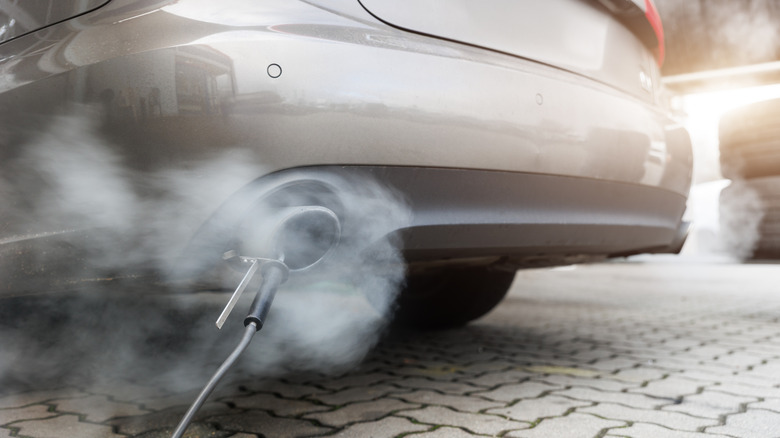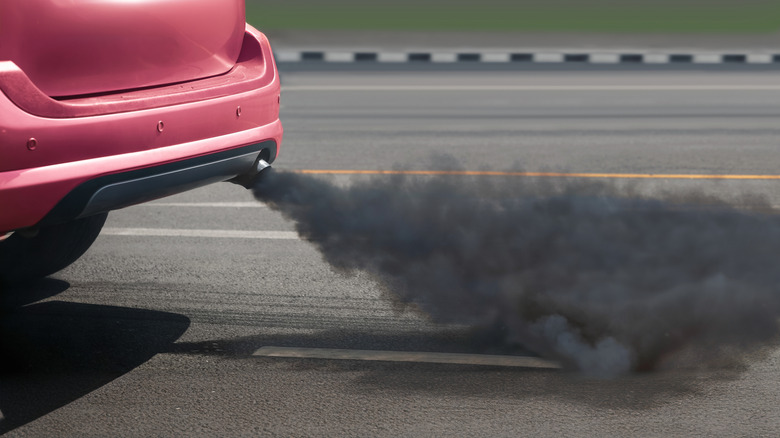Think Twice Before Performing This Car Mod – It Could Get Your Registration Revoked
Modern-day emissions regulations have led automakers to make their vehicles as clean as possible. They achieve this through several means, including engine downsizing, hybridization, forced induction, particulate filters, direct injection, and more. These technologies are managed by thousands of lines of code stored in the car's computer modules, intended to coordinate these systems to minimize emissions and maximize efficiency.
These modules include, among others, the powertrain control module and the engine control module. If these were to be re-flashed or swapped out for different modules, it could negatively change the car's emissions footprint, and could get your registration revoked. This is exactly what happened to Jarek Vetriderz, a TikToker who swapped computer modules in his RAM truck after converting an automatic transmission into a manual.
Although replacing the modules allowed him to eventually pass the emissions test, the state of Utah flagged the change as tampering. This ended with the revocation of his vehicle registration, and permanently immobilized his truck. This case highlights how tightly emissions compliance is tied to the software and hardware in a modern vehicle, and why you should think twice before performing this car mod.
Module swaps can get you in trouble
According to the Environmental Protection Agency (EPA), tampering, removing, or rendering inoperative any emissions‑control devices or element of design on a vehicle is prohibited by the Clean Air Act. This means that flashing, swapping, or removing factory-installed modules can be considered illegal, especially if it alters your vehicle's emissions profile. Beyond the federal level, each state has its own regulations, which can effectively make tampering stricter or less lenient. Therefore, make sure to check the rules in your specific state if you plan on doing anything similiar.
For instance, in Colorado, tampering with any of the car's original emissions systems can cause it to fail emissions testing. In stricter states such as Maryland, tampering with a car's emissions components can even land you with civic liability. More specifically, it can land you a fine of $25,000 per day, per violation. On the other hand, some states such as Michigan don't require most cars to perform emissions testing, so tampering is harder to detect and enforce. Aftermarket ECU chips, popular among the car community, are illegal in California under California Air Resource Board smog rules.
How control modules control emissions
For an engine's combustion process to go smoothly, many things need to happen in the correct order. The engine needs to be consistently supplied with the correct mixture of fuel and air, and the spark plug needs to fire at the right time. All of these processes are monitored by control modules which run thousands of lines of code to keep everything in check.
Control modules act like conductors leading an orchestra. Only when all the instruments — air, fuel, valves, and turbos play in coordination, will there be perfect harmony. Automakers tune these "symphonies" of code precisely in order to reach a specific emissions level and to make the car as efficient as it can be. This allows them to sell cars with a certified emissions rating. If you tamper with these codes, you are basically giving the conductor a page of broken sheet music.
Although the instruments may still play, they are likely to be out of sync and out of tune. Moreover, according to a paper presented at the 2022 Transport Research Arena, tampering with emissions systems can spike Nitrogen Oxide by up to 850 times the norm. The paper also noted particulate numbers rising thousands of times compared to untampered vehicles. Considering how much CO2 an average car produces, this makes tampering a major environmental concern.


